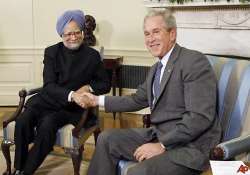Manmohan Singh ensured he had his way on n-deal
New Delhi: Otherwise chary of asserting or projecting himself or upstaging the Gandhi family, Prime Minister Manmohan Singh "made sure he had his way" on the India-US civil nuclear deal, says a new book on

New Delhi: Otherwise chary of asserting or projecting himself or upstaging the Gandhi family, Prime Minister Manmohan Singh "made sure he had his way" on the India-US civil nuclear deal, says a new book on him that has kicked off a lot of political dust during a heated election campaign.
His achievement in stitching together the India-US civil nuclear deal and successfully overcoming domestic resistance to it, including from his own party boss, is chronicled in "The Accidental Prime Minister: The Making and Unmaking of Manmohan Singh" (Penguin) that hit the stands over the weekend.
While trying to get the support needed for the India-US civil nuclear deal, Manmohan Singh was "left to his own devices and he made sure he had his way," the book said. "He cajoled the nuclear establishment into falling in line. He pushed (then national security adviser M. K.) Narayanan to seal the deal. He ignored the doubters in the external affairs ministry and empowered the believers."
"He convinced President Bush that backing the deal, at home and abroad, was in America's interest too. He went to Trombay and addressed scientists. He went to Washington DC and addressed Congress. He reached out to China and Pakistan, softening their resistance. He spoke repeatedly in Parliament, at length and emphatically, and courted public opinion," the book noted.
Faced with the threat of his resignation if the party failed to support him on the nuclear deal, Sonia buckled. "There was no one else in the party who had his qualities of competence and compliance. She was certainly not prepared to name Pranab Mukherjee as prime minister or even as deputy prime minister."
Early on in his tenure when Manmohan Singh realised he would not be allowed free run in matters of governance, due to pulls and pressures of the Congress party and allies, he "decided that foreign policy was one area where he would be the boss".
His achievement in stitching together the India-US civil nuclear deal and successfully overcoming domestic resistance to it, including from his own party boss, is chronicled in "The Accidental Prime Minister: The Making and Unmaking of Manmohan Singh" (Penguin) that hit the stands over the weekend.
While trying to get the support needed for the India-US civil nuclear deal, Manmohan Singh was "left to his own devices and he made sure he had his way," the book said. "He cajoled the nuclear establishment into falling in line. He pushed (then national security adviser M. K.) Narayanan to seal the deal. He ignored the doubters in the external affairs ministry and empowered the believers."
"He convinced President Bush that backing the deal, at home and abroad, was in America's interest too. He went to Trombay and addressed scientists. He went to Washington DC and addressed Congress. He reached out to China and Pakistan, softening their resistance. He spoke repeatedly in Parliament, at length and emphatically, and courted public opinion," the book noted.
Faced with the threat of his resignation if the party failed to support him on the nuclear deal, Sonia buckled. "There was no one else in the party who had his qualities of competence and compliance. She was certainly not prepared to name Pranab Mukherjee as prime minister or even as deputy prime minister."
Early on in his tenure when Manmohan Singh realised he would not be allowed free run in matters of governance, due to pulls and pressures of the Congress party and allies, he "decided that foreign policy was one area where he would be the boss".